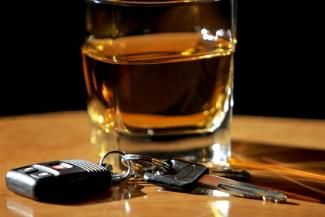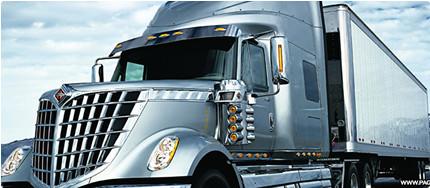Review Questions - Click On The Picture To Begin...

- Any amount
- BAC of .02
- BAC of .08
- BAC of .04
Quote From The CDL Manual:
Illinois law requires drivers operating a commercial motor vehicle (CMV) or a non-commercial motor vehicle (nonCMV) on highways to automatically give their consent to submit to certain tests to determine blood-alcohol concentration (BAC). A CDL holder may not operate a commercial vehicle with a BAC of .04 or more or a noncommercial vehicle with a BAC of .08 or more.
- Any driver operating a CMV or non-CMV who refuses to submit to chemical testing or submits to a test with results in excess of the legal limit is disqualified for a minimum 12 months.
- Any driver convicted of DUI (regardless of BAC) is disqualified for a minimum 12 months.
- If either violation above takes place while transporting placarded hazardous materials, the driver is disqualified for a minimum three years.
- A driver who commits two of the above violations, arising from two or more incidents, is disqualified for life.
- A CDL holder operating a CMV found to have any alcohol in his or her system is placed out of service for at least 24 hours.
- Anyone convicted of driving a commercial motor vehicle with any amount of drug, substance or compound resulting from unlawful use or consumption of cannabis listed in the Cannabis Control Act or controlled substance listed in the Controlled Substance Act is disqualified for a minimum 12 months.
TruckingTruth's Advice:
CDL holders can be criminally charged for driving under the influence with a .04 BAC or higher, but will be placed out of service for 24 hours if any trace of alcohol is detected in their system
- At least 24 hours
- A driver will not be placed out of service unless they have a .04 BAC
- At least 12 hours
- A driver will not be placed out of service unless they have a .08 BAC
Quote From The CDL Manual:
A CDL holder operating a CMV found to have any alcohol in his or her system is placed out of service for at least 24 hours.
TruckingTruth's Advice:
Alcohol is taken very seriously for commercial drivers. If you have any alcohol in your system at all, you will be placed out of service and will most likely lose your job. While you will not be criminally charged for driving under the influence unless your BAC is .04 or higher, you can still lose your job for any level under that and will certainly be placed out of service. A good rule of thumb is "24 hours from bottle to throttle." In other words, don't even think about driving for 24 hours after your last drink.
- Excessive Speeding
- Following Too Closely
- All of these are serious traffic violations
- Improper Lane Usage
Quote From The CDL Manual:
The following are listed as serious traffic violations:
- Excessive Speeding
- Reckless Driving
- No Valid CDL
- Following Too Closely
- Improper Lane Usage
- Conviction Involving a Fatal Accident
- Multiple Licenses
- .05
- .02
- .08
- .04
Quote From The CDL Manual:
A CDL holder may not operate a commercial vehicle with a BAC of .04 or more or a noncommercial vehicle with a BAC of .08 or more.
TruckingTruth's Advice:
It is important to note that any CDL holder found operating a commercial vehicle with any level of alcohol in his or her system will be placed out of service for a minimum of 24hrs. Drivers will not be criminally charged unless their BAC is .04 or higher, but commercial drivers are not allowed to operate commercial vehicles with even a trace amount of alcohol in their system.
And don't even think about having any alcohol anywhere in the cab of the truck at anytime - not even in the side box. If you get caught with it, it will likely be the end of your job, and possibly worse.
- A minimum of 6 months
- A minimum of 3 months
- A minimum of 1 year
- A minimum of 9 months
Quote From The CDL Manual:
A conviction for violation of an out-of-service order results in disqualification for a minimum six months
TruckingTruth's Advice:
The department of transportation may put drivers out-of-service for several reasons, including equipment problems, hours of service violations, alcohol violations, and any other reason they deem fit. Do not violate the out-of-service order as that is a very serious offense and could ruin your career.
- Any speed of 15 mph or more above the posted speed limit
- Any speed of 10 mph or more above the posted speed limit
- Any speed of 20 mph or more above the posted speed limit
- Any speed of 25 mph or more above the posted speed limit
Quote From The CDL Manual:
Excessive speeding involving any single offense for any speed of 15 mph or more above the posted speed limit.
The following may also result in excessive speeding:
- Failure to reduce speed to avoid an accident.
- Driving too fast for conditions.
- Exceeding the speed limit in a school zone.
TruckingTruth's Advice:
Excessive speeding is considered a "serious traffic violation." Two serious traffic violations within a three-year period results in a two-month disqualification. Three serious traffic violations in the same period results in a four-month disqualification.
- Any driver convicted of DUI (regardless of BAC)
- Anyone convicted of driving a commercial motor vehicle with any amount of drug, substance or compound resulting from unlawful use or consumption of cannabis listed in the Cannabis Control Act or controlled substance listed in the Controlled Substance Act
- Any driver operating a CMV or non-CMV who refuses to submit to chemical testing or submits to a test with results in excess of the legal limit
- All of these will disqualify a CDL holder for 12 months
Quote From The CDL Manual:
Law requires drivers operating a commercial motor vehicle (CMV) or a non-commercial motor vehicle (nonCMV) on highways to automatically give their consent to submit to certain tests to determine blood-alcohol concentration (BAC). A CDL holder may not operate a commercial vehicle with a BAC of .04 or more or a noncommercial vehicle with a BAC of .08 or more.
- Any driver operating a CMV or non-CMV who refuses to submit to chemical testing or submits to a test with results in excess of the legal limit is disqualified for a minimum 12 months.
- Any driver convicted of DUI (regardless of BAC) is disqualified for a minimum 12 months.
- If either violation above takes place while transporting placarded hazardous materials, the driver is disqualified for a minimum three years.
- A driver who commits two of the above violations, arising from two or more incidents, is disqualified for life.
- A CDL holder operating a CMV found to have any alcohol in his or her system is placed out of service for at least 24 hours.
- Anyone convicted of driving a commercial motor vehicle with any amount of drug, substance or compound resulting from unlawful use or consumption of cannabis listed in the Cannabis Control Act or controlled substance listed in the Controlled Substance Act is disqualified for a minimum 12 months.
TruckingTruth's Advice:
Please note the limit to be criminally charged for DUI when operating a commercial vehicle is a BAC of .04. However, anyone caught operating a commercial vehicle with any amount of alcohol will be placed out of service for a minimum of 24hrs. Most trucking companies will immediately discharge a driver caught with any amount of alcohol in their system.
- Passing a school bus receiving or discharging passengers or displaying a warning not to pass
- Performing an illegal U-Turn
- Passing a vehicle stopped for a pedestrian in a crosswalk.
- Driving on a sidewalk
Quote From The CDL Manual:
Reckless Driving Operating a CMV or non-CMV in a manner that exhibits a willful, wanton or reckless disregard of the safety of persons or property.
- Passing a vehicle stopped for a pedestrian in a crosswalk.
- Driving on a sidewalk.
- Passing a school bus receiving or discharging passengers or displaying a warning not to pass.
TruckingTruth's Advice:
Reckless driving is a serious traffic violation which carries additional consequences. Two serious traffic violations within a three-year period results in a two-month disqualification. Three serious traffic violations in the same period results in a four-month disqualification.
- Less than 12 seconds of following distance
- Less than 8 seconds of following distance
- Failure of a truck to leave sufficient distance for being overtaken by another vehicle
- Less than 400ft of following distance
Quote From The CDL Manual:
Following Too Closely:
- Following the vehicle ahead too closely.
- Failure of a truck to leave sufficient distance for being overtaken by another vehicle.
TruckingTruth's Advice:
While the CDL manual specifically states "failure of a truck to leave sufficient distance for being overtaken by another vehicle" there are many scenarios in which a driver can be charged with following too closely. But that is the answer you'll most likely see if asked on an exam.
Following too closely is considered a serious traffic violation and carries with it additional consequences. Two serious traffic violations within a three-year period results in a two-month disqualification. Three serious traffic violations in the same period results in a four-month disqualification.
Following too closely is one of the most dangerous things you can do. Keeping plenty of following distance is absolutely critical to safe driving.
- Minimum of 24 months
- Minimum of 18 months
- Minimum of 12 months
- Minimum of 6 months
Quote From The CDL Manual:
The following offenses also will lead to disqualification:
- Knowingly and willfully leaving the scene of an accident while operating a CMV or non-CMV results in disqualification for a minimum 12 months.
- Committing a felony while operating a CMV or non-CMV results in disqualification for a minimum 12 months.
- A conviction for either offense above while carrying placarded hazardous materials results in disqualification for a minimum three years.
- A conviction for violation of an out-of-service order results in disqualification for a minimum six months.
- The use of a CMV or non-CMV in the commission of any felony involving manufacturing, distributing or dispensing a controlled substance, or possession with intent to manufacture, distribute or disperse a controlled substance,results in a lifetime disqualification.
Operating a commercial motor vehicle in violation of regulations pertaining to railroad-highway grade crossings:
- First conviction 60-day disqualification
- Second conviction within a three-year period -120-day disqualification
- Third and subsequent conviction within a three year period - one year disqualification.
- Excessive speeding
- Following too closely
- No valid CDL
- All of these answers are serious traffic violations
Quote From The CDL Manual:
Excessive speeding involving any single offense for any speed of 15 mph or more above the posted speed limit.
- Failure to reduce speed to avoid an accident.
- Driving too fast for conditions.
- Exceeding the speed limit in a school zone.
Reckless Driving Operating a CMV or non-CMV in a manner that exhibits a willful, wanton or reckless disregard of the safety of persons or property.
- Passing a vehicle stopped for a pedestrian in a crosswalk.
- Driving on a sidewalk.
- Passing a school bus receiving or discharging passengers or displaying a warning not to pass.
No Valid CDL Operating a CMV without a valid CDL.
- Operating a CMV with an improper classification or restriction.
- Violation of an instruction permit.
Following Too Closely Following the vehicle ahead too closely.
- Failure of a truck to leave sufficient distance for being overtaken by another vehicle.
Improper Lane Usage Improper or erratic traffic lane changes.
- Improper lane changing, lane usage and/or center lane usage.
- Improper passing.
- Passing on a hill or curve or when prohibited.
- Passing on wrong side of the road.
- Improper passing on shoulder, left or right.
- Driving wrong way on a one-way street or highway.
- Driving on the left side of the roadway.
- Passing in a school zone.
Conviction Involving a Fatal Accident A violation of any state law or local ordinance relating to motor vehicle traffic control (other than parking violations) arising in connection with a fatal traffic accident.
Multiple Licenses A violation relating to a CMV driver having multiple driver's licenses.
Two serious traffic violations within a three-year period results in a two-month disqualification.
Three serious traffic violations in the same period results in a four-month disqualification.
- Exceeding the speed limit in a school zone
- Failure to reduce speed to avoid an accident
- Exceeding the speed limit by 10 mph
- Driving too fast for conditions
Quote From The CDL Manual:
Excessive Speeding Excessive speeding involving any single offense for any speed of 15 mph or more above the posted speed limit.
- Failure to reduce speed to avoid an accident.
- Driving too fast for conditions.
- Exceeding the speed limit in a school zone.
TruckingTruth's Advice:
As a serious traffic violation, excessive speeding carries additional consequences. Two serious traffic violations within a three-year period results in a two-month disqualification. Three serious traffic violations in the same period results in a four-month disqualification.
- Complete employment and driving record for the previous 10 years
- Any suspension, revocation or cancellation of their driving privileges, as well as any disqualification or out-of-service action, within one day of notification of action
- Current marital status
- Any traffic violation within 30 days of the date of conviction
Quote From The CDL Manual:
Commercial drivers also must notify their employer of the following:
- Any traffic violation within 30 days of the date of conviction.
- Any suspension, revocation or cancellation of their driving privileges, as well as any disqualification or out-of-service action, within one day of notification of action.
- Complete employment and driving record for the previous 10 years.








 TT On Facebook
TT On Facebook